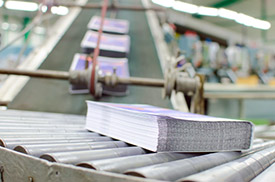Paper Shortage? Changes and Challenges for Publishers
 Print is NOT dead. But unfortunately, the paper it is printed on is going through some much needed but major changes, and that certainly affects the way we get our information into the hands of interested readers.
Print is NOT dead. But unfortunately, the paper it is printed on is going through some much needed but major changes, and that certainly affects the way we get our information into the hands of interested readers.
As publishers, we depend on the ability to print our publications in the format and style our audience has grown used to. So what happens when your printer says that your favorite paper or coating is no longer an option — or that four weeks is no longer sufficient notice for getting your print run out on time?
Times are changing
According to Daniel Ward, supply chain director for The Sheridan Group, the paper mill industry has gone through a series of changes in the recent past. A decline in demand meant too much capacity, resulting in lower or negative profits for most mills. Over the past year, we’ve seen a number of mill closures, mergers, and acquisitions among some of the larger paper suppliers and manufacturers. In such mergers, interests of shareholders can take precedence over interests of customers, resulting in papers being changed or discontinued without concern for or prior notice to customers.
As a recent Dead Tree blog post explains, printers and publishers share concern that recent mergers and acquisitions could result in a shortage of certain papers if something happens to interrupt current supply. For example, the supply and production of a very popular #3 grade paper produced by only a few mills (e.g., Verso, New Page, and Sappi) could be radically changed because of an announced merger between Verso Paper Corporation and New Page at a time when Sappi is retooling its plant to be more energy efficient.
In addition, paper suppliers Sappi and Verso have recently announced price increases on coated free sheet papers. Many printers are forced to deal with all these changes in the paper supply industry by substituting papers — often without telling customers.
Sheridan is diligently working to limit the impact on our customers, says Ward.
He says, “There will be situations where substitutions will be required in order to maintain schedule. In many cases the substitute stock is indistinguishable and the only indication will be on the customer’s invoice, where the paper will be identified as Grade 3 versus the specific brand name, for instance. In other cases there may be a discernible difference in look and feel, in which case the Account Manager will contact the customer to review the options.
“These tight market situations are the reason that most printers have gone over to a grade-paper program rather than a brand-specific program. This gives the purchasing department maximum flexibility in planning and negotiating on our customers’ behalf and allows substitutions to be made seamlessly.”
Adjusting to change
To deal with changes in the paper industry, some publishers have begun to embrace alternative papers. For example, National Geographic magazine is now including recycled content papers in all its publications. This sends an important message to those publishers that have been slow to adopt recycled fiber for their publications and will likely result in more publishers following suit. Ward also cautions that moving to specialty papers such as high recycled content could limit available options, increase costs, and result in longer lead times. By allowing all options to be considered, we can identify solutions to meet the demands of the publishing community while also achieving company goals and controlling costs.
Considering alternative paper choices does not have to be negative in consequence. Publishers may want to consider a different paper type to help differentiate their publications in look or feel.
Education and communication are key in this challenging printing environment. At Sheridan, sales people will be encouraging publishers to communicate printing needs early — don’t wait until the last minute to arrange your print run. Early planning will allow us to make best recommendations for paper and ensure timely fulfillment of your job.
[cta]Contact your Sheridan representative, Susan Parente at susan.parente@sheridan.com, for the latest on paper supply news. We’ll help you maintain paper quality regardless of industry changes.[/cta]

